Is There Such a Thing as Too Much Retrieve in a Retriever?
I've always liked the idea of using what dogs do naturally to my advantage in training; it just makes sense. When they began naming different breeds of dogs, the "retriever" was not on accident. It was very much intentional and describes their primary purpose. When it comes to breeds today, what we ask of them has evolved, but the "retrieve" in the retriever typically remains strong. In our last column I posed the question, "Is it really possible for a retriever to have too much retrieve?". The answer to that question is predicated on how we handle them. Some will become nightmares, others a dream come true, most are somewhere in between. All are a direct result of our influence, particularly early on.
One of the most common struggles in retriever training for many is connected directly to the retrieve. The most common questions I receive messages on has to do with retrieve, and more specifically, the delivery. Very rarely does anyone have issues with pups running out to chase or pick something up, it's getting them back that becomes the issue.
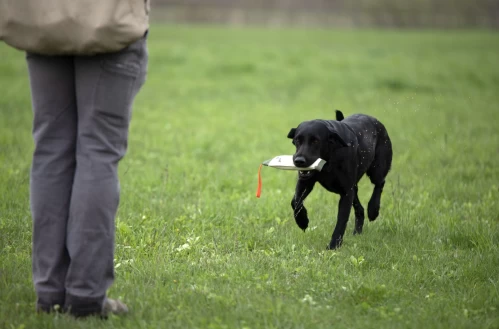
What's Too Much?
I've had many tell me that their pup has "too much" of something, always followed by "for their own good". Ironically, it's usually something that breeders and owners are after and find desirable. It could be energy or drive, intelligence or nose, It might even be a desire to retrieve, but it's always connected to "too much for the pup's own good". Me personally, I think it's more likely too much for the Handler's own good.
Something that I've noticed almost immediately after spending very little time with Bella is how big her desire is to always have something in her mouth. She was constantly picking things up and carrying them around to the point of it often becoming a nuisance. I get it, a pup that is constantly grabbing your shoes, laundry items both clean and dirty, the kid's toys, sticks, rocks and anything else they can fit in their mouth would for many be dubbed a pup with "too much". In Bella's case, she was particularly drawn to sandals, slippers and croc's and earned the nickname of "Crocodile Hunter" within 3 days of her arrival. What many might call "too much retrieve" was something that stood out to me from the day we brought her home. After thinking about it, she's not the only pup I've seen this in. Instead, I think I have just become a lot more observant of the little things with her as this "Bella...Be Good" project has given me reason to document and analyze her training process and progress in much greater detail. Noting it early ensured that I acted on it early.
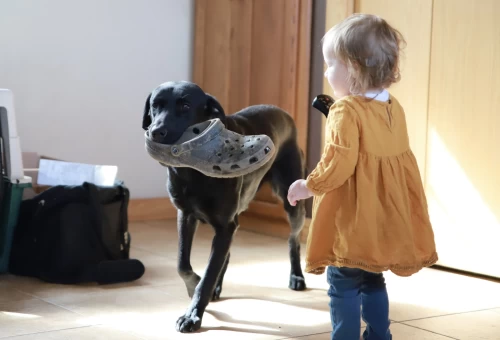
It's All About Perspective
One man's trash is another's treasure just as one handler's problem is another's blessing. To call Bella's desire to carry something in her mouth a "problem" is silly. I think we have the opportunity to form most situations into either a positive or a negative experience and as the handler, we make that choice. I also think that the great majority of issues we face are created by the handlers themselves. It's not the breed, the breeder, or the individual pup's fault. It's almost always unintentional and oftentimes, simply overlooked. Avoiding an issue from the start is the easiest and most productive way to do anything, including training a dog. The key is in recognizing the issue quickly and then changing to shape or form what's desired. Simply put, don't train in something today that you'll need to train out tomorrow.
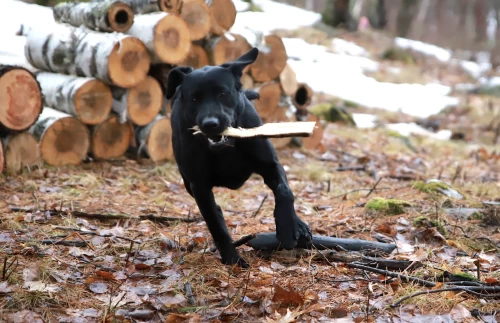
When it came to Bella, I had to first recognize what was happening, then realize what the potential consequences we may face if I didn't change or reform the behavior quickly. I know our end goal when it comes to her retrieve is a quick out and back with a clean delivery to hand. I also know that everything a puppy does is in some way an opportunity to learn. This was our chance to start forming a desirable behavior using a less than desirable situation. Countless times I found myself getting down to the ground level and encouraging her to carry something in her mouth and to come to me with it. I was careful to never discourage or correct her while carrying something, never turned it into tug of war, and certainly never gave chase to her with anything in her mouth, regardless of what the object might be. It doesn't take long for these fast-growing pups to be quicker and nimbler than we are. You remember the scene when Rocky Balboa is chasing the chickens, don't be like Rocky! Instead, I encouraged her to bring it into me, encouraged her to hold it, and even shared it back and forth before taking it away and putting it up where she could no longer get at it.
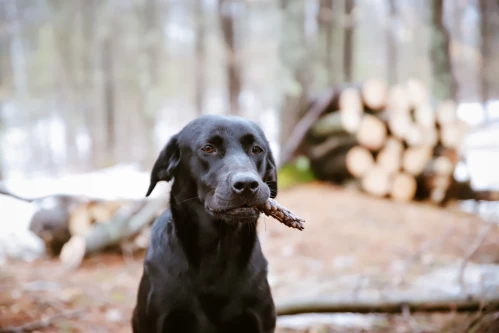
Keep in mind that a puppy is always learning so we must always be training, one way or another, good or bad. If the moment you picked something up, you were scolded harshly or smacked with the rolled-up newspaper by your leader, how inspired would you be to pick something up again? What if every time you picked something up, your handler was quick to snatch it away from you with no "good dog" or any kind of praise? What if when you picked something up, someone would start chasing you like it's a big game of keep away, hooting and hollering and making all kinds of excited noises? The more you ran around wildly with the object in your mouth, the louder the human would get! For a young pup, that game can be a lot of fun! What if you picked something up and carried it around with no interest from your handler? Eventually, you lose interest yourself or find something else more exciting, drop the object and the cycle repeats itself. Have you seen any of this before, do any sound familiar? All of these scenarios are habit forming for your young pup, it's simply that the wrong habits are being formed.
Hold On
"Hold Conditioning" is a necessary process with every retriever and I put a big emphasis on its importance. Hold is different than Forced Fetch, but that's a column completely in itself and we can talk more on that later. What we need to remember now is that hold conditioning will be relatively simple if we prepare for it from the beginning.
Do's
1. Ensure every "retrieve" is positive, regardless of the object.
2. Get the pup back to you quickly.
3. Encourage them to hold every time.
4. Share the object back and forth with them rather than just taking it away.
Don'ts
1. Leave "stuff" laying around that they can get access to.
2. Chase them with anything in their mouth.
3. Play tug of war.
4. Scold or correct them for picking something up.
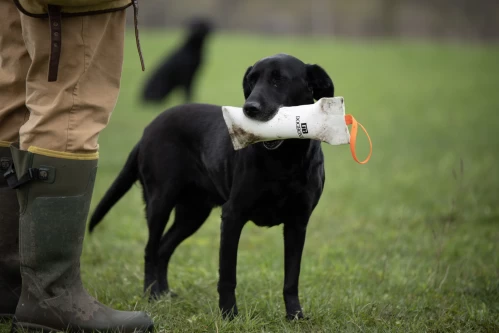
Keep this in mind, act on it early and often and ensure that "too much" of anything does not end up as a problem for you or our pup.
For more journals: Jer's Journal
For Products: DB Store
For Video Retriever Training: DB Training Libray

 About
About Reviews
Reviews Free Videos
Free Videos Journal
Journal Podcast
Podcast

%COMMENTS%